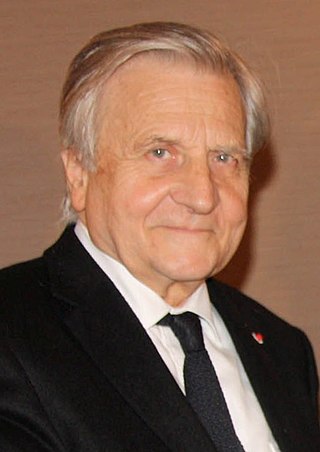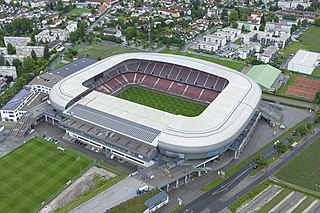
Jean-Claude Trichet is a French economist who served as President of the European Central Bank from 2003 to 2011. Previous to his assumption of the presidency he served as Governor of the Bank of France from 1993 to 2003.

HypoVereinsbank (HVB), legally registered since late 2008 as UniCredit Bank AG, is a significant bank in Germany headquartered in Munich. It has been part of the Milan-based UniCredit group since 2005, and fully owned by it since 2008. As a consequence, HVB is operating exclusively in Germany, where it mainly focuses on private clients business and corporate banking, customer-related capital market activities and wealth management.

Dexia N.V./S.A., or the Dexia Group, is a Franco-Belgian financial institution formed in 1996. At its peak in 2010, it had about 35,200 members of staff and a core shareholders' equity of €19.2 billion.

UniCredit S.p.A. is an international banking group headquartered in Milan. It is Italy's only systemically important bank and the world's 34th largest by assets. It was formed through the merger of Credito Italiano and Unicredito in 1998 but has a corporate identity stretching back to its first foundation in 1870 as Banca di Genova. UniCredit is listed on the Milan and Frankfurt stock exchanges and is a constituent stock of the Euro Stoxx 50 index of leading shares.
Bayerische Landesbank, also known as BayernLB, is a publicly regulated bank based in Munich, Germany and one of the six Landesbanken. It is 75% owned by the Free State of Bavaria and 25% owned by the Sparkassenverband Bayern, the umbrella organization of Bavarian Sparkassen. With a balance of €220 billion and 7,703 employees, it is the seventh-largest financial institution in Germany.

Wörthersee Stadion, known as 28 Black Arena for sponsorship reasons, is a multi-purpose stadium located in Klagenfurt, Austria. It is the home ground of Austria Klagenfurt. The stadium is situated within the Sportpark Klagenfurt campus of several other sports venues. Its name refers to the nearby Wörthersee lake.
The Norddeutsche Landesbank Girozentrale is a German Landesbank and one of the largest commercial banks in Germany. It is a public corporation majority-owned by the federal states of Lower Saxony and Saxony-Anhalt with its head office in Hanover and branches in Braunschweig and Magdeburg. Regional Sparkassen hold a minority stake of 35 percent.
The Addiko Bank is an Austrian banking group with numerous cross-border activities in the Alps-Adriatic region. The group is active in Slovenia, Croatia, Bosnia and Herzegovina, Serbia and Montenegro. However, the bank itself did not have a banking license in Austria, which now owned by Austrian Anadi Bank, another bank that was spun off Hypo Alpe-Adria-Bank International AG.
The Hypo Real Estate Holding AG is a holding company based in Munich, Germany which comprises many real estate financing banks. The company's activities span three sectors of the real estate market: commercial property, infrastructure and public finance, and capital markets and asset management. Hypo Real Estate is the second largest commercial property lender in Germany.

Schloss Velden is a castle in the Austrian tourist resort of Velden am Wörther See, Carinthia. It is run as a year-round hotel located on the western shore of Lake Wörth (Wörthersee).
The 2008–2009 Belgian financial crisis is a major financial crisis that hit Belgium from mid-2008 onwards. Two of the country's largest banks – Fortis and Dexia – started to face severe problems, exacerbated by the financial problems hitting other banks around the world. The value of their stocks plunged. The government managed the situation by bailouts, selling off or nationalizing banks, providing bank guarantees and extending the deposit insurance. Eventually Fortis was split into two parts. The Dutch part was nationalized, while the Belgian part was sold to the French bank BNP Paribas. Dexia group was dismantled, Dexia Bank Belgium was nationalized.
A bad bank is a corporate structure which isolates illiquid and high risk assets held by a bank or a financial organisation, or perhaps a group of banks or financial organisations. A bank may accumulate a large portfolio of debts or other financial instruments which unexpectedly become at risk of partial or full default. A large volume of non-performing assets usually make it difficult for the bank to raise capital, for example through sales of bonds. In these circumstances, the bank may wish to segregate its good assets from its bad assets through the creation of a bad bank. The goal of the segregation is to allow investors to assess the bank's financial health with greater certainty. A bad bank might be established by one bank or financial institution as part of a strategy to deal with a difficult financial situation, or by a government or some other official institution as part of an official response to financial problems across a number of institutions in the financial sector.

Georg Fahrenschon is a German politician of the Christian Social Union (CSU). From 2008 to 2011, he served as finance minister in the Bavarian State Ministry of Finance. He was a member of the Bundestag of Germany until 2007.

European debt crisis contagion refers to the possible spread of the ongoing European sovereign-debt crisis to other Eurozone countries. This could make it difficult or impossible for more countries to repay or re-finance their government debt without the assistance of third parties. By 2012 the debt crisis forced 5 out of 17 Eurozone countries to seek help from other nations. Some believed that negative effects could spread further possibly forcing one or more countries into default.

Markus Thomas Theodor Söder is a German politician serving as Minister-President of Bavaria since 2018 and Leader of the Christian Social Union in Bavaria (CSU) since 2019.

NRW.Bank is the state development bank of North Rhine-Westphalia (NRW) based in Düsseldorf and Münster. Its status is that of a public agency. It is owned by the North Rhine-Westphalia state and supports its structural policy.
Hypo Alpe-Adria-Bank S.p.A. also known as HBI was an Italian bank based in Tavagnacco, in the Province of Udine, Friuli – Venezia Giulia region. The registered office of the bank was located in Udine. In the past, the bank was a subsidiary of Hypo Alpe-Adria-Bank International, which was planned to wind down as "bad bank" and separate saleable assets in 2013 as "good bank". In 2014 the subsidiary was spun off from the bad bank as a separate wind-down unit. As at 31 December 2014, Hypo Italy was a subsidiary HBI-Bundesholding A.G., a Vienna-based sub-holding company for the government of Austria.

Hans Jörg Schelling is an Austrian entrepreneur and politician of the Austrian People's Party and who served as Minister of Finance of Austria in the governments of chancellors Werner Faymann and Christian Kern.

Alexander Picker is an International banker that is currently the CEO of Komercijalna banka AD Beograd.
Sanjeev Kanoria is a London-based liver transplant surgeon, and healthcare entrepreneur. He is the owner and chairman of Advinia HealthCare as well as the vice-chairman of the supervisory board of Austrian Anadi Bank.













